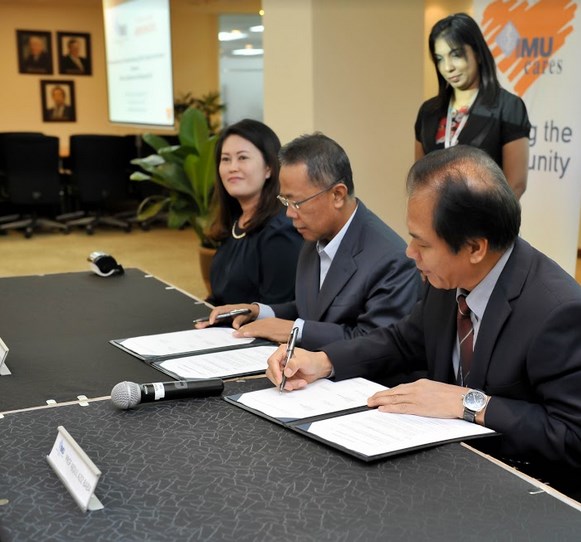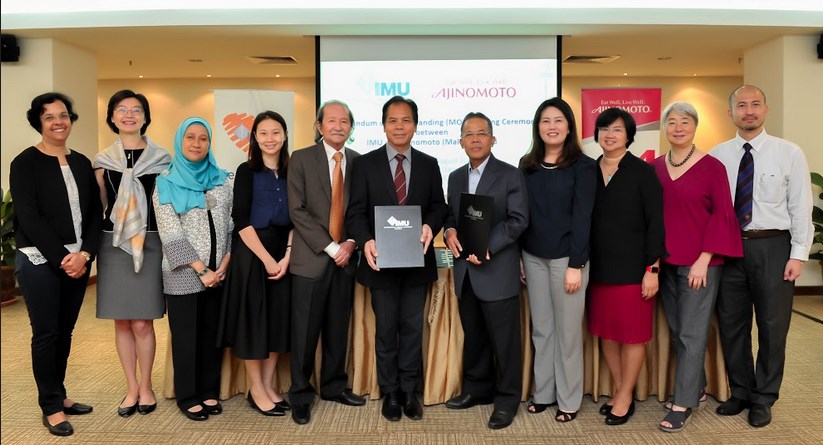In 2015 – 2016, Ajinomoto (M) Bhd (AMB) collaborated with the International Medical University (IMU) in a pilot project titled “Elderly Nutrition Programme” to promote a better quality of life and improve the health standards of golden aged population specifically focusing on low sodium and balanced diet intake through a healthy Umami-rich dietary programme. This project which is part of the Ajinomoto Shared Value initiative and also a project under the University’s IMU Cares, was conducted at Rumah Victory, a home for the elderly in Puchong. Following the success of this project, Ajinomoto had invited IMU to embark on phase two of the project to benefit other elderly homes supported by IMU Cares.
On 9 August 2017, a Memorandum of Understanding (MoU) was signed between IMU and Ajinomoto at the University’s campus in Bukit Jalil. Sealing the collaboration for stage two of the community project were Prof Abdul Aziz Baba, Vice-Chancellor of IMU witnessed by Director of External Affairs who is also the Chair of IMU Cares, Prof Ong Kok Hai and Mr Kamarudin bin Rasid, Chief Administration Officer witnessed by Lau Chin Mun, Head of Corporate Communications Department.

 At the MoU, Prof Dr Winnie Chee, the Dean of the School of Health Sciences, IMU started the event with a welcoming address. In her speech, she spoke of the importance of industry-university partnership to address pressing research in the area of Nutrition and Dietetics (N&D). Following this, Prof Aziz expressed his pleasure at the recognition received by the pilot project at Rumah Victory which was implemented under the leadership of Dr Snigdha Misra, from the Division of Nutrition and Dietetics, IMU. Phase One of the project received a Silver Award at Global CSR Awards and Summit at Langkawi on 30 March 2017. On behalf of Ajinomoto, Ms Lau shared their commitment to social responsibility and their success of the pilot project “Elderly Nutrition Programme”.
At the MoU, Prof Dr Winnie Chee, the Dean of the School of Health Sciences, IMU started the event with a welcoming address. In her speech, she spoke of the importance of industry-university partnership to address pressing research in the area of Nutrition and Dietetics (N&D). Following this, Prof Aziz expressed his pleasure at the recognition received by the pilot project at Rumah Victory which was implemented under the leadership of Dr Snigdha Misra, from the Division of Nutrition and Dietetics, IMU. Phase One of the project received a Silver Award at Global CSR Awards and Summit at Langkawi on 30 March 2017. On behalf of Ajinomoto, Ms Lau shared their commitment to social responsibility and their success of the pilot project “Elderly Nutrition Programme”.  This project aims at improving the appetite of the elderly through the application of Umami. Umami refers to glutamate — a type of amino acid, which occurs naturally in many foods such as meat, fish, vegetables and various dairy products. It is also referred to as the “fifth taste, which accompanies salty, sweet, sour, and bitter, which could get older adults improve their food intake. Sensitivity to umami taste contributes to good overall health among the elderly. This project will benefit the residents in an elderly home. The current menu used for them will be modified into a low-sodium-balanced diet through the application of Umami. These modified diets will help them to lower their sodium intake thereby controlling their blood pressure.
This project aims at improving the appetite of the elderly through the application of Umami. Umami refers to glutamate — a type of amino acid, which occurs naturally in many foods such as meat, fish, vegetables and various dairy products. It is also referred to as the “fifth taste, which accompanies salty, sweet, sour, and bitter, which could get older adults improve their food intake. Sensitivity to umami taste contributes to good overall health among the elderly. This project will benefit the residents in an elderly home. The current menu used for them will be modified into a low-sodium-balanced diet through the application of Umami. These modified diets will help them to lower their sodium intake thereby controlling their blood pressure.
The Phase 2 of the project, aimed to be done in an elderly home, under IMU Cares. Periodic health check-ups will be conducted to monitor the health parameters of the elderly. The care providers will be trained on the food preparation by the IMU Nutrition and Dietetics team. This is a yearlong project. The management and the use of ingredients will be taught and monitored for a duration of 1 year on a daily basis to ensure the improvement of the overall health of the residents.
The project aims to benefit about 50 elderly, by improving their appetite and lowering their dietary sodium levels thereby improving their overall quality of life.

